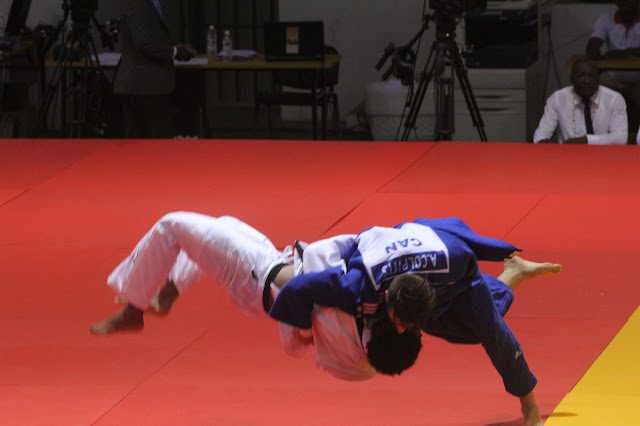Ivory Coast: Undercover Anglophone
 |
| No time to blog (I am in blue). |
I shall start by apologizing for vanishing from the face of the earth (or at least my blog) for three consecutive weeks. One of my favorite hobbies is judo, an Olympic grappling sport that originates from Japan. I have been competing for many years and was given a spot on the Francophone Games Team. Ironically I am an anglophone attending the Francophone Games. This being said I am bilingual (english and french) so I am at least able to communicate with the locals while I am there. It was my best international result so far which has me excited but I am still sad that I didn't medal. I went 3-2 for bronze and only lost to other Canadians who are going to senior worlds in a few weeks.
From a technological perspective the Ivory Coast is an interesting topic. Africa has tended to lag far behind in technology which isn't necessarily a bad thing. The lag has allowed for some rapid jumps to newer technology. At least in the city I was in (Abidjan) there was a lot of cellphone users that all had internet through mobile networks. What surprised me most was how little mobile phone plans were.
Wireless Woes: Self Interference and Spectrum Reuse
 |
| Original Tower Configuration |
What I had guessed was that the internet was slow due to capacity. In the Athlete Village (think compound with armed guards where all the athletes live), they had some official Francophone Games Wireless Internet services. It was free to use and an open connection for all but fortunately the range didn't extend far beyond the compound.
External people were able to get into the athlete village as approved vendors or visitors if they had the proper credentials. There was a company called J-Spot that was offering a secure wireless network to the athlete village. They were walking around the compound and trying to drum up some business with prices were pretty reasonable. I considered getting the connection until I had done some investigation as to why our official games internet wasn't working very well.
With many athletes on it I had assumed it was slow due to capacity. To confirm my theory I decided to do some investigation. Thanks to Android Developer Mode (it is called that right?) I was able to turn on verbose wifi logging and see all the panels, frequencies and their power levels. What I saw was very alarming. Looking at the frequencies for the systems in use, they were nearly all on the same frequency.
The official games networks were all running in different frequencies and seemed to have been reasonable well planned. J-Spot however was an atrocity. Be it an intentional or accidental configuration, they were causing a massive interference problem. The official games had probably 10 panels setup around the compound and weren't using excessively high power levels. J-Spot had decided to have panels everywhere with insanely high power levels relative to everything else.
Trying to use the official games wifi on 2437 MHz at around -70 dBm results in a pretty good connection. Only problem is that J-Spot was also running a panel at 2437 MHz at -50 dBm so good luck getting much through. We could get the odd burst of internet but for the most part our connections were so unstable we couldn't send as much as a Facebook message.
I addressed this concern to the Canadian-NB Mission staff and I am guessing they told the games authority since some network changes were made in a few days. Sadly they didn't really know how to address the issue and only made the interference issues worse.
 |
| Tower Configuration 2.0 |
It may be hard to see in the photo but they turned one of the panels 90 degrees so it is pointing at another panel and then added on the white disc (another panel) to provide a "fix" for the problem.
Fortunately an internet provider from the area called MTN came in a setup ANOTHER network for the athletes on a frequency that wasn't in use by anybody in the area. Finally all the privileged North Americans could get back to their Facebook, Twitter and Instagram.
Mobile Phones: Internet for All
Based on what I had seen I have been led to conclude that bypassing individual wired connections for users with simply having a greater wireless capacity gets more users online faster. Sure the internet wasn't particularly fast (< 1 Kbps at times) but with a low cost of plans users can get internet. In Canada, users can get a small amount of data and unlimited talk and text for $40 CAD to $50 CAD. Equivalently in the Ivory Coast or merely $22 CAD users can get equivalent or better plans.I do realize that Canadian Dollars are a stronger currency than the Ivory Coast Francs (CFA) but the cost to provide is still much cheaper. Ivory Coast users seemed to be primarily using their phones, no TV, home-phone or internet connection besides their phone which does dramatically reduce the costs they would have for communication/entertainment.



Comments
Post a Comment